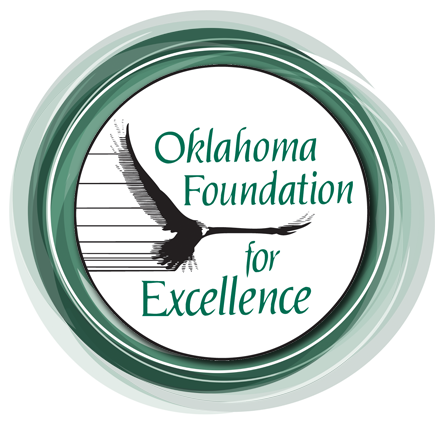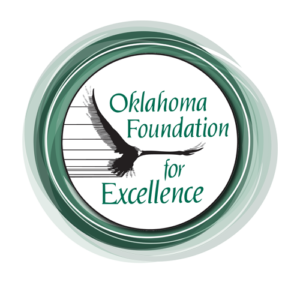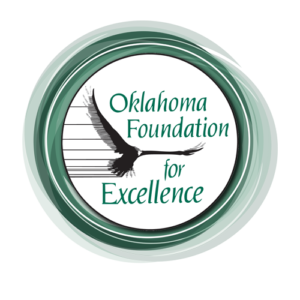Foundation Builders
Founding Trustees Share Landmark Moments in 35-Year History
It all began with great teachers.
David Boren, the visionary founder of the Oklahoma Foundation for Excellence, says the seeds of inspiration for the foundation were planted in his childhood by remarkable teachers – first-grade teacher Ruth Robinson, high school English teacher Margaret Casey, debate coach H.B. Mitchell. “I got to attend good public schools with great teachers,” Boren said. “I attribute any success I’ve had to that good public education and feel strongly that all young people should be provided with the same opportunities I had.”
Boren recalls when he was governor attending a State Teacher of the Year ceremony, in which the remarkable honoree received little fanfare and was awarded a department store gift card and small plaque. “Surely we can do better in the way we honor our great public school teachers,” he thought.
In 1985, then a U.S. Senator, Boren drew on those seeds of inspiration and wrote to 150 of the state’s top corporate and community leaders inviting them to become trustees of a statewide education foundation to support excellence in education. All but two said “Yes!” Their first organizational meeting, held in Kerr-McGee Auditorium in Oklahoma City, was an exhilarating exchange of ideas that helped build the framework for the Oklahoma Foundation for Excellence – the state’s premiere organization dedicated to recognizing and encouraging academic excellence in public schools.
To celebrate OFE’s 35th Anniversary Annual Meeting, five of those founding trustees gathered online for a virtual panel discussion about landmark moments in the foundation’s history. The discussion, led by founding trustee and historian Bob Burke, can be viewed in full on the foundation’s YouTube page. Here are some of highlights.
An Idea Takes Shape
Poteau banker Steve Holton recalled the palpable excitement of being at that first Trustee’s meeting in Oklahoma City. “I had a sense that this was going to be a great thing and something I would always be proud to be part of,” he says. After David Boren gave opening remarks and shared his vision for honoring teachers, Holton recalled, the floor was open for discussion. The late Doug Fox, who was then CEO of the Tulsa Tribune, suggested the foundation also honor students.
“Doug stated, ‘We have All-State in athletics, we have All-State in choir, we have All-State in band. Why not All-State for academics?’” Holton recalled. “I remember thinking, ‘that’s a brilliant idea! I wish I would have thought of that.’”
From that first meeting, the ideas for Medal for Excellence and Academic All-State Awards began to take shape. “You can say at that first trustees’ meeting 35 years ago, an idea became a reality,” Boren said.
The First Selection Committee
Longtime state education leader Kyle Dahlem was among the founding trustees involved in the developing the selection process for Academic All-State and Medal for Excellence Awards. She described the distinguished committee who crafted the assessment process.
“Dr. Savoi Lottinville, OU Regents History Professor Emeritus, was the first selection committee chair. He emphasized the qualities of an exceptional teacher whose influence made a difference in students lives,” she said. Other committee leaders emphasized the importance of the written word, rigor in the selection process, diversity of race and gender, and leadership. Retired Regents chair Avalon Reece held that students should not be selected just on grades and test scores, but on multiple characteristics and how they took advantage of academic opportunities available in their communities.
“Each year the committee meets to reflect on the process and how it has worked and can be made better,” Dahlem said. “But we have always spoken to the integrity of the assessments.”
The Academy Awards of Public Education
In recent years, the foundation’s Academic Awards Banquet has been described as the “Academy Awards” of public education in Oklahoma. David Boren credited the first banquet chair, the late Anne Alspaugh, with designing a spectacular gala awards ceremony that bestowed great honor on teachers and students. Alspaugh commissioned Composer Jerry Neal Smith to create the “Fanfare for Excellence” – the music still used today for the Academic All-Staters’ triumphant march into the banquet hall. She also came up with the ideas of having award presenters and a keynote speaker.
“She literally created out of whole cloth – out of nothingness – the framework for the ceremony that we still follow today,” Boren said. “We owe her a tremendous debt of gratitude.
Boren also praised the late Tulsa oilman Walter Helmerich, who launched an endowment campaign to support the Academic Awards Program after experiencing the event firsthand as an award presenter. “He called me and said, ‘This organization must have a permanent endowment, otherwise it’s not going to last. I volunteer to raise the first $1 million,’” Boren recalled. “When Walt Helmerich makes an offer like that, you immediately accept!”
Helmerich put up the first $50,000 and challenged other successful business leaders to do the same. Today, that $1 million fund has grown to over $7 million, supporting the program in perpetuity.
Building Grassroots Support for Public Schools
Just as the Oklahoma Foundation for Excellence was getting its start, the local education foundation (LEF) movement was emerging around the nation. Founding trustee Nancy Grigsby, whom Boren has described as the “Mother of the LEF movement in in Oklahoma,” met with school foundation leaders on the East and West Coast and excitedly returned to Oklahoma to start public school foundations in Norman and later Bartlesville. Grigsby worked with David and Molly Boren to establish OFE as an umbrella organization to support local education foundations. In 1987, the State Department of Education hired Grigsby to help school districts establish new foundations, so she was able to help the state and OFE work together in those early days.
“It was the foundation’s trustee Frank Robson who really gave a boost to this effort because he saw the value in creating a staff position with OFE, and he generously funded that position and continues to fund it to this day,” Dahlem shared. “His proposed program was the second major program for the foundation. That first coordinator was the dynamic Susan Paddack, who went all over the state establishing these local education foundations” – now numbering 220.
Founding trustee Linda Rodgers recalled the first Fall Forum for Local Education Foundations in 1989, a daylong event that offered breakout sessions for school foundation leaders on topics ranging from fundraising to board governance. “The first Fall Forum had 300 people in attendance, and we were thrilled to host the U.S. Secretary of Education as our keynote speaker,” said Rodgers, who twice served as Fall Forum chair. “He complimented OFE and said he wished he could replicate what we were doing across the country. Many community leaders went home that day encouraged, and many new foundations were started because of that first Fall Forum!”
While the panel discussion focused on the early years of the foundation, participants acknowledged the tremendous growth and impact of OFE programs such as the Colonial Williamsburg Teacher Institute, Teacher Professional Development Programs and the Boren Mentoring Initiative. Through its five programs and partnerships, the foundation has awarded more than $12.4 million in awards, grants and scholarships benefiting Oklahoma teachers and students.
“The contributions to Oklahoma by the Oklahoma Foundation for Excellence in the first 35 years are enormous – absolutely enormous,” Burke concluded. “A lot of folks have been helped in Oklahoma because of your idea, Chairman Boren, and because of the hard work of our trustees.”




